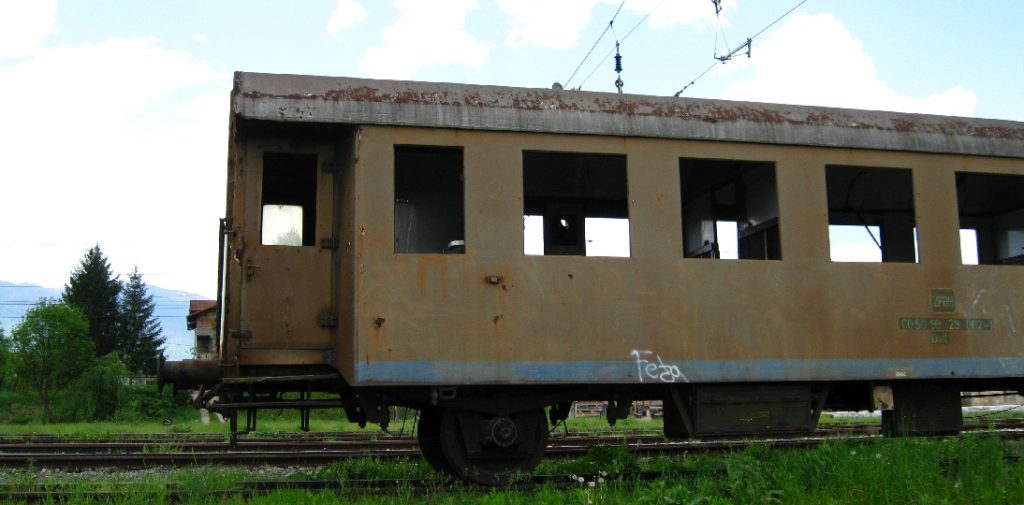
The Reed Trains
Whenever I hear the word “train,” I instantly think of summer vacations in Brcko. My father’s family lived in that city situated on the river Sava, famous for the entrepreneurship and trade expertise of its residents. Every summer, our parents sent my brother and I, two pubescent lads, to visit our grandparents and aunts. We traveled by rail from northwestern Bosnia to the eastern city of Vinkovci, a major railroad hub at the time.
There we had to transfer to a Brcko-bound train that looked like one from the Wild West. We glided through the ancient Posavina woods, which sprang up at the bottom of the once vast Pannonian sea. We alternated between sunlit regions and passageways of deep shade, which smelled of fern and sweet putrefaction dissolving into fertile soil. An occasional mosquito would fly into the compartment and land on a clammy forehead. In case you were wondering, the river Sava is near, with plum orchards stretching beside it. Travelers from various places smile and chitchat. They travel to Brcko to trade, to steal, to romance, to escape, to surprise, to disturb… Baby chicks chirp in a basket on the floor next to the wooden seats, while I listen to Posavina dialect interwoven with undulating accents. You can also hear Ekavian, Macedonian, followed by Romani, and some opaque, rampant language that sounds like a black magic sorceress and whose name I’ll never find out.
A short walk separated our grandfather’s house from the Brcko train station, which existed on the margins of the former Yugoslavian transportation system. Despite its insignificance, cargo trains frequently roared through. We climbed the footbridge above the railroad and observed the overloaded freight cars disappearing over the horizon, transporting the goods to places where microscopic people lived. In the optimistic rumble of the locomotives and the thunderous creaking of the wheels you could hear the power of the socialist Yugoslavia: its economic existence and the production capacities of its industrial complexes. Something colossal and serious pulsated over us as we climbed a cherry plum tree to watch a freshly beheaded chicken run erratically around the courtyard before it ended in an oven, encircled by slices of homegrown potatoes.
Enveloped in the scent from a nearby distillery, Adi, my cousin Mirza and I used to line up and count the cargo cars. I believe my brother and my cousin were overwhelmed with pride, at least I know I was. The more cars I counted, the more important I felt, as if they were being sent just to me, bringing me gifts. The longer the composition, the stronger my self-conceit. I grew inside even when I felt disheartened because of something; the passing of the iron beast restored my self-confidence. I admired that monster, hoping that it would never end and that I would never stop counting aloud. One, two, three, four…
* * *
The year I turn eighteen, artillery piles up on the hills around Bosnian-Herzegovinian towns. The creaking of tanks replaces the creaking of trains. The electric grid above the railways loses power. Log barricades are sprouting up on the tracks, the soldiers languish at sandbagged tunnel entrances. The joy of gliding, of ascending mountain slopes with ease, of speeding across lakes and rivers, through the woods and canyons, has come to an end by the early nineties. No more nurturing the illusion of land as a boundless space, nor springing up in joy because you are conquering the rugged and vast terrain from the comfort of a train compartment, as if you are in some sort of mobile penthouse.
The trains transform into shelters from artillery fire, armored vehicles for penetrating enemy territory, and improvised sleeping quarters for the army. However, most of them serve no purpose at all. They loiter in deserted stations, with only one mission: to rust. Some are riddled with bullets and shrapnel. On windy days they play melodies that could intrigue even the most accomplished Peruvian flutist. Their music occasionally transmutes into a whistle of a teapot–you are not in the Andes, the high-pitched tone reminds you, but in the Bihac valley, under siege.
Once the draft began, yesterday’s passengers were given their marching orders and guns. A switch operator became a GI and a locomotive engineer an artilleryman. Another switch operator had his limbs amputated, and another locomotive engineer was liquidated, while some other passengers scattered across Scandinavia and the New World. This game of guessing what happened to those who once traveled by rail or earned their daily bread on it could last an eternity. In one of those trains there are those who will end up in mass graves as well as those who will shoot them in the back of the head; in the same compartment, there is a girl who will be raped, sitting next to the future wife of the solider who will do it. The conductor perhaps escaped deep into the woods, deserting both the crime and the heroism. He lost himself in the company of bears, no longer caring whether or not the war had ended.
Across Posavina, eastern Bosnia, Krajina, and the Neretva valley, solitude re-inhabited the countless hamlets where it had reigned before the industrial era. Remote villages, which the train once connected to the rest of the world, were emptied of human kind. Their houses were blown expertly into the air, the fertile soil was infested with mines. Even to this day, instead of the panting of a locomotive, many valleys are filled with the whispers of townsfolk who were expelled into the world of the invisible by violent death. You can sense the presence of the ghosts, carrying the stench of clothes scattered along the stream, creating flitting shadows on the crumbling walls. A child from the other dimension plays with the plastic bag that flies between the ruins. Phantoms float above the tracks, taking shelter in the tunnels.
28. X 2010.
Nihad Hasanović
Translated from the Bosnian by Amir Husak